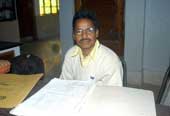 |
| PUCL general secretary Shashi Bhushan Pathak. Picture by Hardeep Singh |
Pathak did his masters in Hindi from Banaras Hindu University, then got a postgraduate degree in English from Ranchi University, and topped it with an MA in linguistics from Calcutta University.
Pathak, who has been a member of several panels constituted to probe cases of human right violations in Jharkhand and neighbouring states, spoke to Anupam Sheshank on his mission.
It is difficult to give an exact definition of human rights in today?s world. But broadly, human right movements have three distinct aims, to ensure respect for human life, to promote social development and to ensure better standard of living for all. In India, the PUCL?s fight is to ensure citizens get their constitutional rights.
I disagree. You have to take action against the guilty. If we start taking this line, there can be no action against anyone. There will be total anarchy and lawlessness. A person who commits a crime must be punished, even if it violates the human rights of his close relatives.
There are several aspects of human right violations in Jharkhand. Though this is a predominantly tribal state, the state government has been attacking the cultural and political rights of the tribal people. Laws and rules might have been framed to protect them, but they are not implemented. We have seen landlords buy large tracts of land in Shivri-Dubrajpur in Dumka. The local Santhali people have remained mere labourers. Doesn?t this prove that the Santhal Pargana Tenancy Act has been a failure? Once, when we had gone to Dumka to probe a case, the landlords there held us hostage the whole night and even snatched our diaries.
Thousands of Adivasi girls are being taken to metros to work as maidservants. A large number become unwed mothers which tells a story of exploitation.
But the most striking story of violation of human rights in the state is that of displacement. The lives of those displaced in Bokaro, Jamshedpur and Hatia are yet to return to normal. The government has done little to solve their problems.
The Koel-karo project took lives of many innocent persons in 2001, when the police opened fire on them. The Netarhat field firing range is feared to displace over a lakh of persons. We have heard that the Union government has decided to shelve the project, but already agriculture and cattle has been damaged.
Let?s say our work would have been much easier if they were sensitive.
Our rising credibility and popularity among the masses has worried the state government. That has resulted in our being labelled pro-Naxalite. We do not support or oppose anyone. We are only concerned with human rights.
The ground reality is that the government wants to form gangs of criminals in the name of Nagarik Suraksha Samitis. We do not advocate any armed revolution, but are also against Sendra, (lynching). No agency can take over the work of the judiciary. Fake encounters cannot be accepted, let alone encouraged.
There are several instances of the police killing innocent people. Prayag Yadav was a 59-year-old. He was also a high-ranking MCC leader, but the fact remains that he was killed in a fake encounter in Daltonganj last year when he was ill.
The manner in which the Nagrik Suraksha Samiti killed many rebels in Ghurabandha is unfair. Oppressive laws like Pota have been misused extensively in Jharkhand. When we oppose the government on these issues, we are called pro-extremists.
Then again, the government has started giving mining leases to private parties without taking villagers into confidence. When we oppose this, we are alleged to be hand in glove with the Naxalites.
We are often asked this question, especially by police officers. Well, as a matter of fact, human rights of each and every human being should be our concern. But what needs to be realised is that there is an entire government department to protect a policeman or an officer, or even assist him, economically or legally, when he is a victim of extremist violence. There are provisions. for economic assistance and compensation.
But, on the other hand, the people who have to suffer police excesses have no support from the state. They need an agency like the PUCL to help them get justice.
Even then, we keep a safe distance when the encounter is real and not orchestrated.
According to our estimates, over two dozen hunger deaths occurred in the state last year. The reports came from Manatu, Leslieganj, Dumka and other parts of the state. When our teams went there, they found that the reports were true though the government does not accept them as hunger deaths.
The then deputy commissioner of Palamu wanted postmortems done.
His argument was that if even a single grain was found in the body, it would not be considered a case of hunger death.
The government does not consider hunger deaths and deaths by diseases due to malnutrition or hunger the same. We fail to see the difference. There is a reason behind the government?s hair-splitting between the two types of death. There is a Supreme Court, which has laid down that the chief minister and chief secretary of a state would be held responsible if a hunger death was confirmed there. No one wants to go to jail, so it is better to claim that no death has been caused by hunger.
As far as the PUCl is considered, we have tried to ensure justice to the victims and their family members.
We have appealed to the state government to initiate peace talks. I met the former director-general of police, R.R. Prasad, and requested him to follow in Andhra Pradesh?s footsteps.
The PUCL will be very happy if talks are successful in the state. We also request the rebels to come forward for peace. If any such move is taken, we are ready to play mediators.











